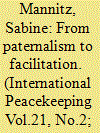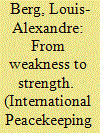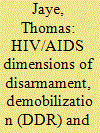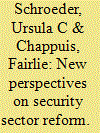| Srl | Item |
| 1 |
ID:
133143


|
|
|
|
|
| Publication |
2014.
|
| Summary/Abstract |
This paper discusses the shortcomings of the established Security Sector Reform (SSR) concept and practice and argues for an overhaul of the ways in which transformations in security spaces are approached. In consideration of the theoretical and practical implications of the quest to involve local actors in SSR, a related research agenda is sketched and a case is made in particular for the inclusion of social anthropological perspectives to foster an empirically grounded evaluation of security governance interactions and transformations in context. This could be relevant to the search for strategies to support longer term facilitation processes and overcome the widespread paternalism in donor-recipient relations.
|
|
|
|
|
|
|
|
|
|
|
|
|
|
|
|
| 2 |
ID:
133135


|
|
|
|
|
| Publication |
2014.
|
| Summary/Abstract |
The mixed results of efforts to reform the governance of security forces in the aftermath of conflict require deeper examination of the political constraints that shape statebuilding processes. In Bosnia and Herzegovina, attempts to restructure and centralize the security forces led to a substantial though incomplete reform of the military, but limited impact on the police forces. These uneven results are rooted in the nature of political coalitions that constrain recipient leaders and shape their interaction with external actors. While Bosnian leaders mostly relied on a cohesive political base that favoured close links between political parties and the police forces, fragmentation within these parties generated internal threats that enabled reforms to the military. This case demonstrates the limits of external influence without changes to underlying political conditions.
|
|
|
|
|
|
|
|
|
|
|
|
|
|
|
|
| 3 |
ID:
124514


|
|
|
|
|
| Publication |
2013.
|
| Summary/Abstract |
Countries emerging from conflict situations face enormous social, economic, security and political challenges. Contemporary conflicts tend to lead to state and societal collapse, and are characterized by sexual violence and the destruction of fragile economies. Ensuring a safe and secure post-conflict environment for the pursuit of normal life is integral to post-war reconstruction and development processes, and post-conflict environments offer entry points for addressing both the origins and the effects of wars. Accordingly, this article argues that disarmament, demobilization and reintegration (DDR), and security sector reform (SSR), provide important opportunities for incorporating HIV/AIDS issues into broader national security frameworks. Further, the article argues that securitizing HIV/AIDS can ensure that responses to the epidemic are prioritized, but also that the treatment of security personnel should not be privileged over treatment of those who are infected in the larger population.
|
|
|
|
|
|
|
|
|
|
|
|
|
|
|
|
| 4 |
ID:
133134


|
|
|
|
|
| Publication |
2014.
|
| Summary/Abstract |
This special issue identifies new directions in research on the consequences of international involvement in security sector reform (SSR). Both empirically and theoretically, the focus lies on the so far neglected role of local agency and domestic power constellations. The introductory article maps out different ways to analyse the external-domestic interaction dynamics that structure the often contentious and asymmetric encounters between international and local interests and demands in SSR processes. It makes the case for moving beyond a state-centric approach to the study of security governance in areas of limited statehood and for engaging more closely with the layered, mixed or hybrid security orders that can result from external engagement in domestic reform contexts.
|
|
|
|
|
|
|
|
|
|
|
|
|
|
|
|
| 5 |
ID:
133139


|
|
|
|
|
| Publication |
2014.
|
| Summary/Abstract |
Comprehensive Security Sector Reform (SSR) has become a crucial component of many international peace- and statebuilding operations. The paper assesses the consequences of these attempts to foster international standards of 'democratic security governance' in the security sectors of post-conflict or fragile states. The paper builds on qualitative case study research of SSR interventions in Timor-Leste, Liberia, and the Palestinian Territories, conducted 2010-2012, to trace patterns of adoption, adaptation or rejection of international security governance standards by domestic actors. The article uses insights from sociological organization theories to identify different types of 'hybrid security orders' that result from encounters between international and domestic models of security governance in SSR processes.
|
|
|
|
|
|
|
|
|
|
|
|
|
|
|
|